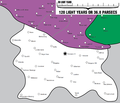Magistracy of Canopus
This article needs to be updated with material from Masters and Minions: The StarCorps Dossiers, Era Report: 2750, First Succession War. Once these titles clear the Moratorium period, or if they already have, please consider revisiting this article and updating it with the new material. |
Property "Update Needed From" (as page type) with input value "Masters and Minions: The StarCorps Dossiers]], Era Report: 2750, [[First Succession War" contains invalid characters or is incomplete and therefore can cause unexpected results during a query or annotation process.
| Crest of the Magistracy of Canopus | |
| Magistracy of Canopus | |
|---|---|
| Faction Profile | |
| Time period: | 2530 - present |
| Classification: | Periphery State |
| Controlled systems: | 42 |
| Capital world: | Canopus IV |
| Ruler title: | Magestrix |
| Military: | Magistracy Armed Forces |
| Secret Service: | Magistracy Intelligence Ministry |
The Magistracy of Canopus is an interstellar nation located in the Periphery. It was founded in 2530 by Kossandra Centrella, a former MechWarrior for the Free Worlds League Military who opposed the patriarchal systems which dominated the Inner Sphere. The Magistracy is a matriarchal society led by a Magestrix, an elected position open to any woman but largely controlled by House Centrella due to the family's popularity. Disparaged by some for promoting a hedonistic lifestyle, the Magistracy supports an open society and the personal freedom of all citizens and their right to live their lives as they see fit. As such, it is a popular destination for those fleeing persecution or looking to satisfy their discerning tastes.
Contents
History
This Section looks to be a Stub This section is a stub (i.e., in need of additional material). You can help us by expanding it. Please remove this tag when that effort is complete. |
Politics
At its founding, the Magistracy allowed only women to participate in the government or hold any elected office. This restriction eased under Floral Centrella, who allowed men to participate in local and later planetary governments. Crystalla Centrella began to allow men into lower-level positions of the national government in 2570, and within a few years also opened up positions on the lower courts to male judges. It wasn't until after the Reunification War when Military Governor Melissa Humphreys instituted universal suffrage and opened all political and judicial positions to men (barring the Magistrix). After the governorship ended these reforms were maintained by future Canopian governments, ensuring equality for both women and men before the law. However, there has remained a strong cultural bias in favor of women holding positions of authority within Canopian society.[1][2]
While freedom of expression is at the heart of the Canopian constitution, there exists some notable exceptions. Political parties, special interest and lobbying groups are expressly banned for their divisive nature. Additionally, there exists a strong wall of separation between church and state, with no official connection allowed between the government and any one religious or philosophical doctrine.[3][4]
Government
The head of the Magistracy is the Magestrix, an elected autocrat who serves until death (or, following the reforms of Emma Centrella, they are deemed unfit to rule). It is a position technically open to any Canopian woman but has largely been filled by members of House Centrella. Originally imbued with sweeping powers, the position lost much of its authority during the period of military governorship after the Reunification War; most of these powers returned after self-rule was reinstated, but a number of important checks on this power was also created.[5][6]
The Canopian Central Committee was formed by Governor Humphreys as a review board to ensure that any legislation passed by the Magestrix was compatible to the will of the Star League. When the Magestrix regained her authority, the Committee was reformed and its powers expanded. Each Canopian planet elects by popular vote one Committeewoman (or Committeeman) to serve on the Central Committee; originally each member's term of service was for five years, but this was later decreased to two. The Central Committee has the power to review legislation proposed by the Magestrix, and if they do not have a two-thirds majority approval to veto them. The Committee can also pass legislation of its own, though this is subject to a veto by the Magestrix as well.[5][6]
Serving an important if limited role in the government are the Canopian Electors. In the event the Magestrix dies or can no longer rule, it is the Electors who are responsible for nominating her replacement and putting her before a final vote in the Central Committee. If the Committee approves the Elector's nominee by a two-thirds majority, she becomes the new Magestrix; if not, the Electors are responsible for nominating a new woman, with the process continuing back and forth until a nominee attains the required number of votes. Each planet has two Electors who serve lifetime terms, and while a few have become hereditary most are decided by popular vote. Originally only aristocrats could be Electors, but after the reforms of 2840 any adult Canopian citizen could become an Elector.[5][6]
Lastly is the Crimson Council, a governing body responsible for overseeing all aspects of Canopian nobility. Created in 2557 by Coranna Centrella, the Council assumed many of the powers once held by the Magestrix: creating new titles of nobility, assessing the privileges and responsibilities of nobles, and adjudicating in disputes between nobles. The six members of the Council serve at the pleasure of the Magestrix and have adopted robes trimmed in red-dyed ermine as an unofficial uniform.[5][7]
Judiciary
Three different courts oversee the judicial process in Canopian society. The Provincial Courts oversee civil and criminal law at the planetary level, and any citizen may bring a case before them if they have at least one corroborating witness, while the Star Courts are concerned with matters of corporate and business law. Generally the decisions of the Courts are binding and enforced by Magistracy Field Officers, but an individual may appeal to the Courts of Appeal with the approval of the Central Committee. In keeping with the Canopian bias towards personal freedoms, the courts have a reputation for siding with individuals over businesses in disputes between the two. At the same time, the courts' traditionalist bent have also seen them favor aristocrats over the common people in such cases.[5][7]
Citizenship
The Magistracy of Canopus prides itself on having an open and welcoming immigration policy: if any person can prove they are fleeing political, religious or social persecution, they and their descendents are given automatic citizenship. With this citizenship comes tremendous freedoms and protections: for example, they cannot be tried without due cause or extradited without the permission of the Magistrix, and they may own property and transfer it as they see fit. In return, citizens are expected to give back to support the "common defense" of the state. While military service would fulfill this obligation, it can be met any number of ways: service in the MedicalCorps, donations in land, goods or money during times of war, or participation in the educational system such as teaching adult literacy classes. Additionally, all citizens are required to participate in every election, though on every ballot is the option "None of the Above" (in such cases where this options wins a majority, special run-off elections are typically held).[3][8]
Society & Culture
The Magistracy of Canopus is famous (or infamous) for its strong emphasis on social freedom. So long as all involved are consenting adults and no one is being harmed, Canopians are free to pursue any activity they desire. While such mores can be construed as hedonistic (and indeed the Magistracy was strongly influenced by the New Hedons movement) there also exists a strong epicurean strain to this pursuit of pleasure. Artistic expressions are further encouraged by generous government subsidies, allowing writers, painters, sculptors and actors to concentrate on creating bold new expressions in both popular and serious art. This includes examples of erotica, though most exist for serious purposes rather than simple titillation. Nevertheless, a thriving adult entertainment industry has made the Magistracy a magnet for tourists wishing to partake in the many delights the realm has to offer, or catch a showing of the traveling "pleasure circuses." Regulations exist only insofar as to make sure employees in these professions are well-paid and not being mistreated.[4][9][10]
Likewise the Magistracy's historical tolerance for all cultures has made it a destination for immigration, especially by those facing oppression. The result is a true "melting pot" society, with diverse cultures from across know space living side-by-side and in many cases coming together to create something entirely new. The same holds true for religion, with the result that all major and minor religions and philosophies have found purchase within the Magistracy: from Abrahamic to traditional African religions, Shintoism to Zoroastrianism, Sikhism to Confucianism, and everything in between, including many new religions which have sprung up since humanity began colonizing the stars. The strong emphasis on tolerance also means very little tension exists between the different religious and ethnic groups which make up the Magistracy.[4][10]
If there exists bias within Canopian society, it's one which sees women as more qualified than men to hold positions of authority in political, economic and military affairs. The foundations of this concept were laid at the beginning of the Magistracy's history, when men were barred from holding any government positions. Reforms eventually granted suffrage to all Canopians regardless of gender, and many men have since risen to prominent positions in Canopian society. Still, most in the Magistracy naturally assume women are better at certain jobs than men, with a few commentators openly questioning such presumptions.[10]
One area where Canopian society struggles is in education, which for most of its history relied on the Star League to provide universal primary and secondary schooling. As it collapsed, so did the Canopian national system, leaving it up to the individual cash-strapped planetary and local governments to pick up the pieces. The result was spotty educational outcomes and a steady decline in literacy rates leading up to the 31st century, with only two universities - the University of Canopus and the University of Luxen - essentially little more than technical schools.[9] That trend began to reverse in the middle part of the century thanks to increased government subsidies and outside help, first from the Taurian Concordat then the Capellan Confederation. The new Royal College of Education at the University of Canopus was instrumental in training new teachers to higher standards and supplying them to all Canopian worlds such that universal education was again achieved in 3062. The University of Luxen also opened a new School of Engineering thanks to Capellan help, and the University of Gallis was founded in 3066.[10]Cite error: Closing </ref> missing for <ref> tag
- Alliance Aerospace Group
- Detroit Consolidated Aerospace
- Consolidated MechWorks
- Majesty Metals and Manufacturing
Maps
Magistracy of Canopus After the Age of War, 2571
Magistracy of Canopus After the Reunification War, 2596
Magistracy of Canopus After the Fall of the Star League, 2750
Magistracy of Canopus in 2750
Magistracy of Canopus in 2764
Magistracy of Canopus After the 3rd Succession War, 3025
Magistracy of Canopus in 3085
Magistracy of Canopus as at 3130
Magistracy of Canopus in 3130 (complete)
Historical Maps
after Reunification War
Star League Era
after First Succession War
- MoC-2864.png
after Second Succession War
- MoC-3025.png
after Third Succession War
- MoC-3030.png
after Fourth Succession War
after War of 3039
before Clan Invasion
after Clan Invasion
in 3057
- MoC-3063.png
after Operation Guerrero
- MoC-3067.png
during Second Star League
during Jihad
after Jihad
in 3081
creation of the Republic of the Sphere
before Gray Monday
in 3135
in 3145
References
- ↑ The Periphery, p. 89
- ↑ Handbook: Major Periphery Powers, p. 77
- ↑ 3.0 3.1 The Periphery, p. 91
- ↑ 4.0 4.1 4.2 The Periphery, p. 92
- ↑ 5.0 5.1 5.2 5.3 5.4 The Periphery, p. 90
- ↑ 6.0 6.1 6.2 Handbook: Major Periphery Powers, p. 78
- ↑ 7.0 7.1 Handbook: Major Periphery Powers, p. 79
- ↑ Handbook: Major Periphery Powers, p. 80
- ↑ 9.0 9.1 The Periphery, p. 100
- ↑ 10.0 10.1 10.2 10.3 Handbook: Major Periphery Powers, p. 94-95


























